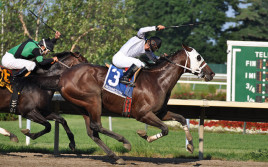Transcript
“We know the jockey wants to win the race, and it is beguiling to imagine the horse knows what the challenge is, knows somehow the significance of the finishing post and therefore is a willing participant in this endeavour.
If you buy into that framework you can imagine the horse views the whip strikes purely as a form of encouragement. ‘Thanks for the encouragement, I needed that….'”
The use of the whip in horse racing is an issue. It is banned in some countries and there are regulations governing its use in others. It is widely used and as Dr Paul McGreevy explains in this podcast, it can be misused.
This is our second podcast on animal welfare and horse racing in collaboration with Knowing Animals, a podcast show from Australia which looks at academic research in the field of animal rights and animal welfare.
In this podcast, vet Dr. Paul McGreevy from the University of Sydney talks about his paper Whip use by jockeys in a sample of Australian thoroughbred races – an observational study ( authors: Paul D. McGreevy, Robert A. Corken, Hannah Salvin, Celeste M. Black PLOS ONE i2012) with Dr Siobhan O’Sullivan of Knowing Animals. He also explains his policy work trying to create policy change around the use of whips on racehorses in Australia.
The goal of the study was to explore the use of the whip in horse racing and to characterise the area struck and the visual impact of whip use at the level of the horse. Dr McGreevy and his colleagues measured the ways in which both padded and unpadded sections of the whip made impact. There was evidence of at least 28 examples, in 9 horses, of breaches of the whip rules (one seam contact, 13 contacts with the head, and 14 arm actions that rose above the height of the shoulder). The whip caused a visible indentation on 83% of impacts. The unpadded section of the whip made contact on 64% of impacts. The results call into question the ability of Stewards to effectively police the rules concerning whip use and, more importantly, challenge the notion that padding the distal section of whips completely safeguards horses from any possible whip-related pain.
Photo: Corinne
You may also be interested in our podcast on horse deaths in jump racing – another collaboration between Knowing Animals and Pod Academy
Tags: Animal Rights, Animal welfare, Horse racing, Horse whip, Jockey


Subscribe with…